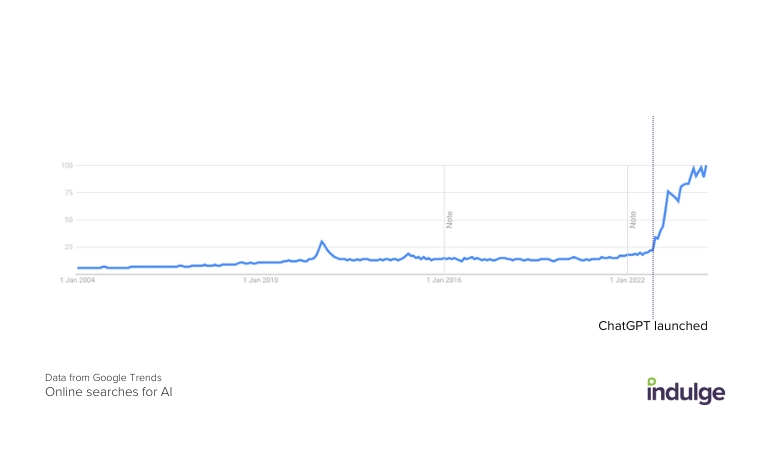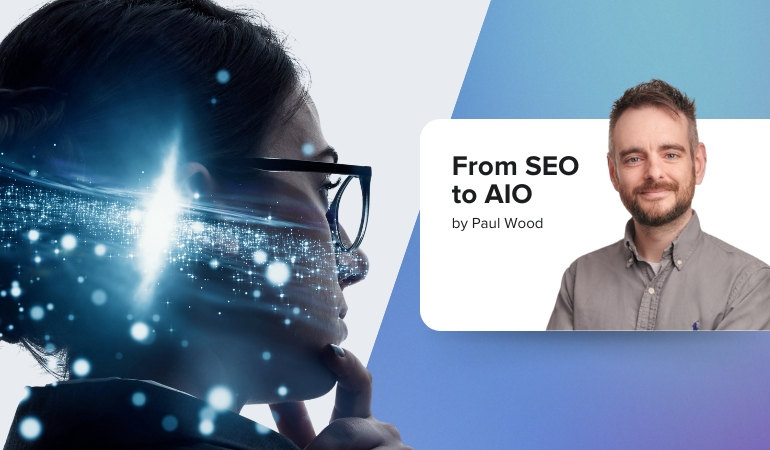SEO will become AIO
Going to your web browser and searching using Google for something you need to find is as close to a universal habit as you’ll get on the web.
I looked over the stats and going back to 2009, Google’s search market share has rarely dipped below 90%.
It’s such a ubiquitous tool that it’s now the subject of intense antitrust cases.
Despite all of this, I believe we’re on the cusp of a properly fundamental shift in how search is used.
When ChatGPT was launched, Open AI opened Pandora’s box.
Think of it like ‘my first generative AI tool’.
In the same way that Tesla didn’t invent the electric car, but is synonymous with the category, so too is ChatGPT in the realm of generative AI.
The result is that ‘the masses’ have now witnessed AI in action.
If you use Google Trends, you can literally see the moment ChatGPT captured the world’s imagination and drove a huge increase in demand for AI.

Now, I don’t think ChatGPT, or its stablemate, SearchGPT is going to replace Google anytime soon.
But, what it has done is prompt every other major tech provider to showcase how AI can enhance what it’s doing.
The result is an ever-growing list of AI-enabled solutions from some of the biggest players in the market.
Here are a few to cut your teeth on:
- Gemini from Google
- Apple Intelligence from Apple
- Copilot from Microsoft
Then there are the products integrated with this technology:
- Google’s Pixel series of phones put Gemini front and centre
- The next generation of iPhones will drive Apple Intelligence
- Microsoft and its partner hardware providers have launched a series of Copilot+ PCs
They all do slightly different things to slightly different levels but there is one major common theme…
They all do more.
More of this, more of that, more of anything they or you can think of.
They don’t do everything you would like them to yet, but they sure as hell will.
It’s this fact that means search habits will change. I don’t think that is up for debate any longer.
Understanding search to understand how it will shift
When we use a search engine, regardless of what we type (or speak) into the search bar, we are fundamentally doing one of a very small number of things:
- Learn - Looking to answer a question
- Find - Looking to find something we don’t yet know about
- Navigate - Looking to navigate to somewhere we already know
That’s pretty much it.
If I search for ‘Now TV login’, I’m attempting to navigate somewhere I know exists. If I search for ‘best headache remedies’, I’m looking for a solution I don’t yet know about. If I search for ‘when did the Roman Empire fall?’, I’m trying to learn something new.
There are limited, if any, cases that fall outside of this model.
Of these use cases, only really one of them is commercially driven (the one where you’re looking for a solution to a problem). The others are merely a means of finding something you already know is out there.
My bet is that learning and navigating will be the first to fall to AI.
If you need a fact, it’s going to be quicker and easier to ask your phone about it out loud.
If you need to get to a login page, an AI agent will bring it to you quicker than Google (in the classic sense) can.
This means the remaining use case concerns finding new things to solve a problem.
By ‘problem’, I mean things like searching for ‘best air fryer’.
One day, your personal AI assistant will almost certainly do a great job of solving this for you. However, right now I think it’s fair to say that the average consumer will still want to choose for themselves.
It’s a question of trust.
This lends itself to a classic search model; a list of options, some information, pricing and pictures.
You pay for the editor
When I studied Journalism in my early 20s, we still talked about newspapers(!).
At the time, Twitter was already a thing and for the most part, it contained all current news stories a reader could wish to know.
If war had broken out, you’d find out first on Twitter. If there was a fire somewhere, Twitter would have pictures published in real time.
Despite this, newspapers (and other news outlets) still had an appeal.
When you purchase a newspaper, you’re not paying for the paper it’s printed on, the ink, or even the words written on the page.
You’re paying for the editor.
It’s the editor’s job to decide what is interesting and what is not. Some people like the tastes of the Sun’s editor, others prefer the tastes of the Telegraph’s editor.
The editor has been trained and hired based on their taste in the news.
That’s what the reader pays to take advantage of.
On Twitter (now X), you are the editor.
That’s great some of the time, but a lot of the time, your lack of skill in trawling through raw news stories is that you don’t know what’s true and what’s false, you don’t know what’s important and what is just PR.
With time, we have learned to trust non-human editors.
Apple News and Google Discover are now widely used. They curate content from sources all across the web and present it to you.
It’s like your own automated editor.
We’re not there yet, but AI agents will soon become this for more than just your news.
Decoupling content and delivery method
I think the rise of AI will speed up the process of decoupling content from the method of delivery.
The classic model of the web is that content is published on webpages, webpages are published on websites, and websites are discovered via search engines and social media feeds.
I think AI agents will change this model.
I believe content will now exist despite its delivery method.
An article may exist on a webpage, but it will also exist in the ‘mind’ of an AI agent.
That AI agent will understand who it’s written by, what brand it’s associated with, and how credible it is.
Because of this, we consumers will be able to experience said content in various different formats.
When we’re driving, our AI agent will be able to read it to us podcast-style. When we’re on our phones, we’ll be able to read a custom summary. When we’re at a desk, we’ll be able to watch a video version of it.
The original content will need to come from somewhere, so websites will remain the single source of truth, but AI agents will be able to do much more with content than a classic web browser + search engine combo.
It’s time for AIO
So, back to my original pitch.
SEO is going to evolve, it has already started and I believe it’s going to be called AIO (artificial intelligence optimisation). Some have suggested the more clunky GEO (generative engine optimisation) as a name, but I’m not convinced it’ll catch on.
AIO will be about the process of getting your content into the ‘mind’ of the AI agents.
It will be about ensuring your information in the AI’s ‘mind’ is accurate and understood correctly.
Increasingly, content will need to be published so that it is ready to be repurposed, is attached clearly to a brand and an expert, and is backed by credentials.
The parameters of AIO are yet to be defined, but it’s happening.





